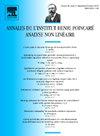Nonlinear modulational dynamics of spectrally stable Lugiato–Lefever periodic waves
IF 2.2
1区 数学
Q1 MATHEMATICS, APPLIED
Annales De L Institut Henri Poincare-Analyse Non Lineaire
Pub Date : 2021-06-03
DOI:10.4171/aihpc/65
引用次数: 5
Abstract
We consider the nonlinear stability of spectrally stable periodic waves in the Lugiato-Lefever equation (LLE), a damped nonlinear Schr\"odinger equation with forcing that arises in nonlinear optics. So far, nonlinear stability of such solutions has only been established against co-periodic perturbations by exploiting the existence of a spectral gap. In this paper, we consider perturbations which are localized, i.e., integrable on the line. Such localized perturbations naturally yield the absence of a spectral gap, so we must rely on a substantially different method with origins in the stability analysis of periodic waves in reaction-diffusion systems. The relevant linear estimates have been obtained in recent work by the first three authors through a delicate decomposition of the associated linearized solution operator. Since its most critical part just decays diffusively, the nonlinear iteration can only be closed if one allows for a spatio-temporal phase modulation. However, the modulated perturbation satisfies a quasilinear equation yielding an apparent loss of regularity. To overcome this obstacle, we incorporate tame estimates on the unmodulated perturbation, which satisfies a semilinear equation in which no derivatives are lost, yet where decay is too slow to close an independent iteration scheme. We obtain nonlinear stability of periodic steady waves in the LLE against localized perturbations with precisely the same decay rates as predicted by the linear theory.谱稳定Lugiato-Lefever周期波的非线性调制动力学
本文在Lugiato-Lefever方程(LLE)中考虑谱稳定周期波的非线性稳定性。Lugiato-Lefever方程是非线性光学中出现的一个带强迫的阻尼非线性Schr\ odinger方程。到目前为止,这种解的非线性稳定性仅通过利用谱隙的存在来建立抗共周期扰动。在本文中,我们考虑了局域扰动,即在直线上可积的扰动。这种局域扰动自然会导致谱间隙的缺失,因此我们必须依靠一种完全不同的方法,从反应扩散系统周期波的稳定性分析出发。在最近的工作中,前三位作者通过对相关线性化解算子的精细分解获得了相关的线性估计。由于其最关键的部分只是扩散衰减,非线性迭代只能在允许时空相位调制的情况下关闭。然而,调制扰动满足拟线性方程,产生明显的正则性损失。为了克服这一障碍,我们结合了对未调制扰动的温和估计,它满足半线性方程,其中没有导数丢失,但衰减太慢而无法关闭独立的迭代方案。我们得到了LLE中周期稳定波在局域扰动下的非线性稳定性,衰减率与线性理论预测的完全相同。
本文章由计算机程序翻译,如有差异,请以英文原文为准。
求助全文
约1分钟内获得全文
求助全文
来源期刊
CiteScore
4.10
自引率
5.30%
发文量
62
审稿时长
>12 weeks
期刊介绍:
The Nonlinear Analysis section of the Annales de l''Institut Henri Poincaré is an international journal created in 1983 which publishes original and high quality research articles. It concentrates on all domains concerned with nonlinear analysis, specially applicable to PDE, mechanics, physics, economy, without overlooking the numerical aspects.

 求助内容:
求助内容: 应助结果提醒方式:
应助结果提醒方式:


